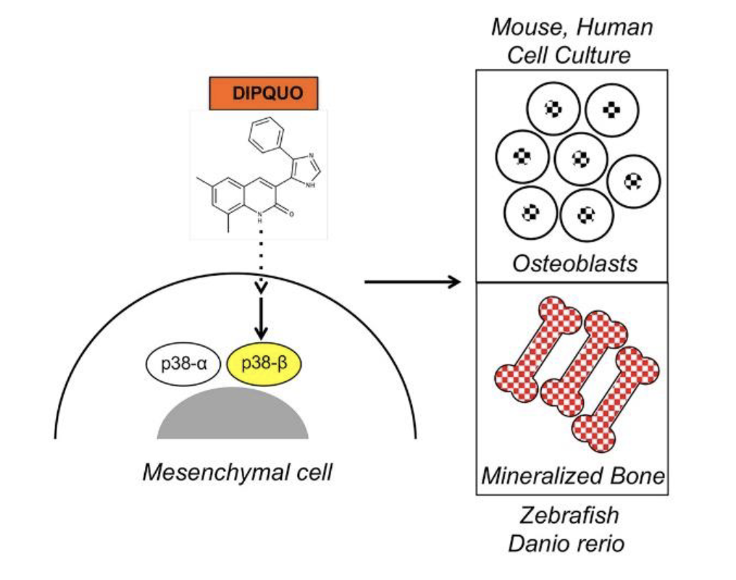Todd R. Evans, Professor of Cell and Developmental Biology in Surgery
Background & Unmet Need
- Bone fractures are the most common impact injury that require medical attention
- About 6 million fractures occur in the US and 5 -10% of these do not heal properly
- About 10 million people in the US have osteoporosis and another 44 million people are at increased risk of developing osteoporosis due to having low bone density
- Individuals with osteoporosis are at increased risk of having a bone fracture
- Recombinant bone morphogenic proteins (BMPs) are approved to treat bone fracture healing, however, this treatment has challenges due to adverse side effects and manufacturing costs
- Unmet Need: Pharmacologically acceptable compounds to aid in bone regeneration and healing
Technology Overview
- The Technology: Small molecule inhibitors that activate osteoblast differentiation
- The Discovery: A high-throughput screen for activators of osteogenesis markers led to the identification of DIPQUO
- DIPQUO drives osteoblast differentiation by activating the β isoform of P38, leading to MAPK signaling and subsequent inhibition of GSK3-β
- PoC Data: DIPQUO treatment accelerated the differentiation of mouse myoblasts and bone-marrow derived human mesenchymal stem cells into mature osteoblasts
- DIPQUO increased the number of osteoblast cells in the caudal fins of zebrafish larvae and increased the mineralization of vertebrae in zebrafish regeneration models
- In addition to the P38 mechanism of action, DIPQUO synergized with other GSK3-β inhibitors to promote osteoblast differentiation
Technology Applications
- Small molecules to stimulate healing of bone fractures
- Therapy to treat osteoporosis and other aging-related chronic disorders associated with bone healing dysfunction
- Therapeutic for hypophosphatasia, a rare bone disease
- Research tool to study P38-β MAPK intracellular signaling in vitro and in vivo
Technology Advantages
- DIPQUO is more effective at stimulating bone deposition in comparison to BMPs
- DIPQUO is a stable small molecule that is less costly to produce at a larger scale than BMPS, which are produced as recombinant proteins
- DIPQUO accelerates bone deposition without inhibiting bone remodeling

Figure 1: DIPQUO activates p38-β MAPK signaling, which leads to differentiation of mouse myoblasts and human bone-derived stem cells into mature osteoblasts. DIPQUO also increases bone mineralization in zebrafish.
Publications
Resources
Intellectual Property
Contact Information

For additional information please contact
Louise Sarup
Associate Director, Business Development and Licensing
Phone: (646) 825-3932
Email: lss248@cornell.edu

